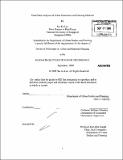| dc.contributor.advisor | William Wheaton. | en_US |
| dc.contributor.author | Lee, Nai Jia | en_US |
| dc.contributor.other | Massachusetts Institute of Technology. Dept. of Urban Studies and Planning. | en_US |
| dc.date.accessioned | 2010-05-25T20:51:56Z | |
| dc.date.available | 2010-05-25T20:51:56Z | |
| dc.date.copyright | 2009 | en_US |
| dc.date.issued | 2009 | en_US |
| dc.identifier.uri | http://hdl.handle.net/1721.1/55133 | |
| dc.description | Thesis (Ph. D.)--Massachusetts Institute of Technology, Dept. of Urban Studies and Planning, 2009. | en_US |
| dc.description | Cataloged from PDF version of thesis. | en_US |
| dc.description | Includes bibliographical references (p. 96-100). | en_US |
| dc.description.abstract | The thesis looks three pertinent issues in Housing Market and Urban Economics literature with panel data- home sales and house price relationship, efficiency of housing market and commercial property taxation. For the first part, I examine the strong positive correlation that exists between the volume of housing sales and housing prices. I develop a simple model of these flows which suggests they generate a negative price-to-sales relationship. This runs contrary to a different literature on liquidity constraints and loss aversion. Our results from both are strong and robust. Higher sales "Granger cause" higher prices, but higher prices "Granger cause" both lower sales and a growing inventory of units-for-sale. These relationships together provide a more complete picture of the housing market - suggesting the strong positive correlation in the data results from frequent shifts in the negative price-to-sales schedule. For the second part, I tested the hypothesis whether the housing market is efficient and whether "bargains" can be found in the market or not. According to the User cost model, house price appreciation is positively correlated to price. Nevertheless, such correlation between price and appreciation can be caused by productivity differences, behavioral reasons or high transaction costs. Using 4 unique sets of panel data at zip code level, I am able to test the efficiency hypothesis without worrying about productivity reasons and transaction costs. In addition, I tested the efficiency hypothesis by removing influences caused by changes in buyers' preferences over time. The results show that appreciation and house price is positively correlated in San Diego, Boston and Phoenix. | en_US |
| dc.description.abstract | (cont.) However, appreciation and house price is negatively correlated in Chicago. For the last part, I examine an unusual phenomenon in Massachusetts, where some municipals impose a high property tax on commercial properties and low tax on residential properties. Unlike past studies, we treat the tax on firms as an entrance fee or compensation for the negative externalities the firms generate. This approach fits our context better because we are dealing with municipals- most of the individuals don't work where they live, and the firms are unlikely to provide them employment or other benefits. I develop a simple model to capture the firms' location decision and residents' demand for services and aversion to firms. The model suggests that rich neighborhoods tend to impose high commercial and residential property tax, as they try to reduce their reliance on firms for services. In addition, the municipals will impose a high commercial property tax rate if the number of firms in municipal is large. I assembled a panel data base covering 351 municipals over a period from 1975-2007. The empirical results strongly support the model, suggesting rich municipals rely less on firms. | en_US |
| dc.description.statementofresponsibility | by Nai Jia Lee. | en_US |
| dc.format.extent | 114 p. | en_US |
| dc.language.iso | eng | en_US |
| dc.publisher | Massachusetts Institute of Technology | en_US |
| dc.rights | M.I.T. theses are protected by
copyright. They may be viewed from this source for any purpose, but
reproduction or distribution in any format is prohibited without written
permission. See provided URL for inquiries about permission. | en_US |
| dc.rights.uri | http://dspace.mit.edu/handle/1721.1/7582 | en_US |
| dc.subject | Urban Studies and Planning. | en_US |
| dc.title | Panel data analyses of urban economics and housing markets | en_US |
| dc.type | Thesis | en_US |
| dc.description.degree | Ph.D. | en_US |
| dc.contributor.department | Massachusetts Institute of Technology. Department of Urban Studies and Planning | |
| dc.identifier.oclc | 598418413 | en_US |
